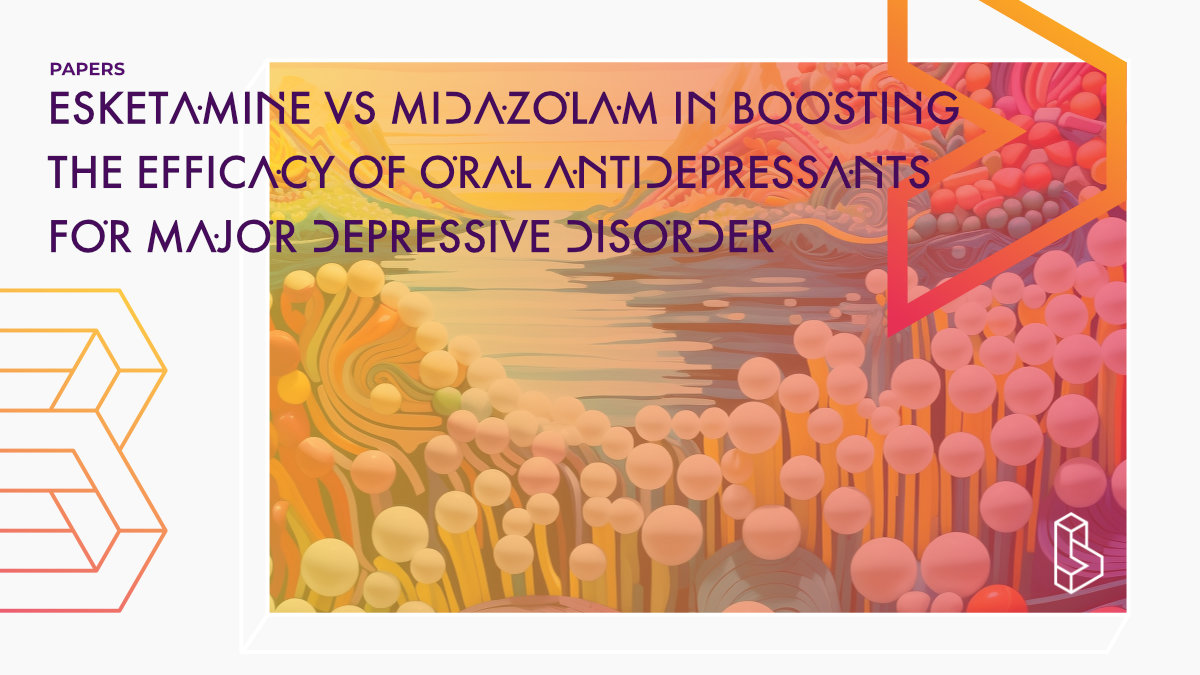This pilot randomized clinical trial (n=30) assessed the efficacy of a single subanesthetic dose of esketamine (14mg/70kg) in enhancing the effect of oral antidepressants for patients with fluctuating responses to treatment in major depressive disorder (MDD). Participants were adults with MDD experiencing fluctuating symptoms despite prior symptom relief and stabilization. The study found that response rates at two weeks were significantly higher in the esketamine group (66.7%) compared to the midazolam control group (6.7%), with a more substantial reduction in depression severity (MADRS score) in the esketamine group.
Abstract of Esketamine vs Midazolam in Boosting the Efficacy of Oral Antidepressants for Major Depressive Disorder
“Importance: Loss of a previously effective response while still using adequate antidepressant treatment occurs in a relatively high proportion of patients with major depressive disorder (MDD); therefore, there is a need to develop novel effective treatment strategies.
Objective: To assess the efficacy and safety of a single subanesthetic dose of esketamine in boosting the efficacy of oral antidepressants for treating fluctuating antidepressant response in MDD.
Design, Setting, and Participants: This single-center, double-blind, midazolam-controlled pilot randomized clinical trial was conducted at Beijing Anding Hospital, Capital Medical University in China. The study enrolled participants aged 18 years and older with fluctuating antidepressant response, defined as patients with MDD experiencing fluctuating symptoms after symptom relief and stabilization. Patient recruitment was conducted from August 2021 to January 2022, and participants were followed-up for 6 weeks. Data were analyzed as intention-to-treat from July to September 2022.
Interventions: All participants in the esketamine-treated group received intravenous esketamine at 0.2 mg/kg in 40 minutes. Participants in the midazolam control group received intravenous midazolam at 0.045 mg/kg in 40 minutes.
Main Outcomes and Measures: The primary outcome was the response rate at 2 weeks, defined as a 50% reduction in Montgomery-Åsberg Depression Rating Scale (MADRS). Secondary outcomes included response rate at 6 weeks, remission rates at 2 and 6 weeks, and change in MADRS and Clinical Global Impression–Severity score from baseline to 6 weeks; remission was defined by a MADRS score of 10 or lower.
Results: A total of 30 patients (median [IQR] age, 28.0 [24.0-40.0] years; 17 [56.7%] female) were randomized, including 15 patients randomized to midazolam and 15 patients randomized to esketamine; 29 patients completed the study. Response rates at 2 weeks were significantly higher in the esketamine-treated group than in the midazolam control group (10 patients [66.7%] vs 1 patient [6.7%]; P < .001). Participants treated with esketamine experienced significantly greater reduction in MADRS score from baseline to 2 weeks compared with those treated with midazolam (mean [SD] reduction, 15.7 [1.5] vs 3.1 [1.3]; P < .001). No serious adverse events were observed in this trial, and no psychotogenic effects and clinically significant manic symptoms were reported.
Conclusions and Relevance: This pilot randomized clinical trial found that a single subanesthetic dose of esketamine could boost the efficacy of oral antidepressants in treating fluctuating antidepressant response, with a good safety profile.“
Authors: Chunfeng Xiao, Jia Zhou, Anning Li, Ling Zhang , Xuequan Zhu, Jingjing Zhou, Yongdong Hu, Yunying Zheng, Jing Liu, Qiying Deng, Haibo Wang, Gang Wang
Summary of Esketamine vs Midazolam in Boosting the Efficacy of Oral Antidepressants for Major Depressive Disorder
Depression is a common chronic and disabling condition that affects an estimated 300 million people worldwide. Pharmacotherapy is the leading strategy in the treatment of major depressive disorder, but relapse and recurrence remain high even among adherent patients.
Unlike relapse and recurrence, loss of a previously effective response while still receiving adequate antidepressant treatment occurs in a relatively high proportion of patients with MDD. This phenomenon is known as ADT tachyphylaxis or antidepressant tolerance.
There is a lack of effective treatments for FAD, including increasing the current antidepressant dose, drug holidays, decreasing current antidepressant dose, changing antidepressant drugs, augmenting treatment strategies, and combination treatment strategies.
Ketamine is a noncompetitive N-methyl-D-aspartate (NMDA) receptor antagonist that has been used in clinical practice as a standard anesthetic for nearly half a century. It can initiate cascading effects acting in concert with existing antidepressants, so combining ketamine with existing antidepressants may be more beneficial for patients with MDD.
Find this paper
https://doi.org/10.1001%2Fjamanetworkopen.2023.28817
Open Access | Google Scholar | Backup | 🕊
Cite this paper (APA)
Xiao, C., Zhou, J., Li, A., Zhang, L., Zhu, X., Zhou, J., ... & Wang, G. (2023). Esketamine vs Midazolam in Boosting the Efficacy of Oral Antidepressants for Major Depressive Disorder: A Pilot Randomized Clinical Trial. JAMA Network Open, 6(8), e2328817-e2328817.
Study details
Compounds studied
Ketamine
Topics studied
Depression
Study characteristics
Placebo-Controlled
Active Placebo
Double-Blind
Randomized
Participants
30
Humans
Compound Details
The psychedelics given at which dose and how many times
Ketamine 14 mg | 1x
